Movement
Each model has at lest 2 bases, and while it is on the table it will always be resting atop one of them.
To move a model place the currently unused base where you’d like the model to move to within the model’s line of sight. This is the target base.
Measure the distance between the current (source) base and the target base to get the measured distance.
If either base touches terrain that can affect movement, or the path between the two bases does, then add the movement modifier for that terrain to the measured distance.
If the measured distance is less than or equal to the movement value of the model, then place the model on the target base.
If the measured distance is greater than the movement value of the model, then move the target base closer to the source by the most direct route possible. Place the model on the target base and give it a single stun marker.
If a model has a waypoints value, then it may use up to that number of additional bases. These bases are placed as if they were target bases and create a path for the model to follow that allows for a less direct route from the starting to finishing positions. While each waypoint base will need to be visible from the last, the source and target bases may end up not having line of sight to each other.
Note that a base must be able to fit along every point of the path.
Once all waypoints have been placed, measure the distance between each one, rounding up to the next whole unit. The sum of these distances is the measured distance. If the total exceeds the movement of the model, then the model is placed on the first waypoint that is within its movement value and it receives a stun marker for each waypoint that it couldn’t reach in addition to the stun for not reaching the originally intended target base.
When a composite model performs a move, only the part of the model with a movement value is activated.
